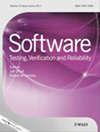Combinatorial testing and model checking
IF 1.2
4区 计算机科学
Q3 COMPUTER SCIENCE, SOFTWARE ENGINEERING
引用次数: 0
Abstract
This issue contains two papers. The first paper focuses on combinatorial testing, and the second one focuses on model checking.Thefirst paper, ‘ Combinatorial methods for dynamic grey-box SQL injection testing ’ by Bernhard Garn, Jovan Zivanovic, Manuel Leithner and Dimitris E. Simos, concerns combinatorial testing for SQL injection. Code injections attacks, and in particular SQL injection (SQLi) attacks, are still among the most critical threats for web applications. These attacks rely on exploiting vulnerabilities, which must be actively chased to deploy a secure system. Leveraging combinatorial testing, the authors propose novel attack grammars to generate SQLi attacks against MySQL-compatible databases. One originality of this contribution resides in dynamically optimizing and improving the attack grammars to the context. This context-sensitive adaptation technique is supported by a prototype tool named SQLInjector + and is validated and benchmarked on a representative set of web applications under test. The contribution is accompanied by a nice addition to the field: a simple framework called WAFTF for testing the filtering tech-niques of web application firewalls such as ModSecurity. (Recommended by Yves Le Traon) The second paper, ‘ Comprehensive evaluation of file systems robustness with SPIN model checking ’ by Jingcheng Yuan, Toshiaki Aoki and Xiaoyun Guo, presents a study that comprehensively evaluates the robustness of file systems using a model checking approach, covering the majority of the mainstream file system types and both single-thread and multi-thread modes. In particular, to abstract real file systems, the authors developed Promela models optimized to avoid state explosion during model checking and used an SPIN model checker to check these models for detecting corner-case errors during an unexpected power outage. The authors analysed counterexamples generated by model checking to determine an improved file system model that is capable of preventing errors in most mainstream file system types and then rechecked the improved file system model and verified the absence of all critical errors.组合测试和模型检查
这一期有两篇论文。第一篇论文的重点是组合检验,第二篇论文的重点是模型检验。第一篇论文,“动态灰盒SQL注入测试的组合方法”,由Bernhard Garn, Jovan Zivanovic, Manuel Leithner和Dimitris E. Simos撰写,涉及SQL注入的组合测试。代码注入攻击,特别是SQL注入(SQLi)攻击,仍然是web应用程序最严重的威胁之一。这些攻击依赖于利用漏洞,必须积极追踪以部署安全系统。利用组合测试,作者提出了新的攻击语法来生成针对mysql兼容数据库的sql攻击。这个贡献的一个独创性在于根据上下文动态优化和改进攻击语法。这种上下文敏感的适应技术由名为SQLInjector +的原型工具支持,并在一组有代表性的被测web应用程序上进行了验证和基准测试。这一贡献还伴随着对该领域的一个很好的补充:一个名为WAFTF的简单框架,用于测试web应用程序防火墙(如ModSecurity)的过滤技术。第二篇论文《基于SPIN模型检查的文件系统鲁棒性综合评估》,作者为袁景成、青木俊明和郭晓云,他们采用模型检查方法对文件系统的鲁棒性进行了综合评估,涵盖了大多数主流文件系统类型以及单线程和多线程模式。特别是,为了抽象真实的文件系统,作者开发了经过优化的Promela模型,以避免模型检查期间的状态爆炸,并使用SPIN模型检查器检查这些模型,以便在意外断电期间检测边缘情况错误。作者分析了模型检查产生的反例,确定了一个改进的文件系统模型,该模型能够防止大多数主流文件系统类型的错误,然后重新检查了改进的文件系统模型,并验证了所有关键错误都不存在。
本文章由计算机程序翻译,如有差异,请以英文原文为准。
求助全文
约1分钟内获得全文
求助全文
来源期刊

Software Testing Verification & Reliability
工程技术-计算机:软件工程
CiteScore
3.70
自引率
0.00%
发文量
34
审稿时长
>12 weeks
期刊介绍:
The journal is the premier outlet for research results on the subjects of testing, verification and reliability. Readers will find useful research on issues pertaining to building better software and evaluating it.
The journal is unique in its emphasis on theoretical foundations and applications to real-world software development. The balance of theory, empirical work, and practical applications provide readers with better techniques for testing, verifying and improving the reliability of software.
The journal targets researchers, practitioners, educators and students that have a vested interest in results generated by high-quality testing, verification and reliability modeling and evaluation of software. Topics of special interest include, but are not limited to:
-New criteria for software testing and verification
-Application of existing software testing and verification techniques to new types of software, including web applications, web services, embedded software, aspect-oriented software, and software architectures
-Model based testing
-Formal verification techniques such as model-checking
-Comparison of testing and verification techniques
-Measurement of and metrics for testing, verification and reliability
-Industrial experience with cutting edge techniques
-Descriptions and evaluations of commercial and open-source software testing tools
-Reliability modeling, measurement and application
-Testing and verification of software security
-Automated test data generation
-Process issues and methods
-Non-functional testing
 求助内容:
求助内容: 应助结果提醒方式:
应助结果提醒方式:


